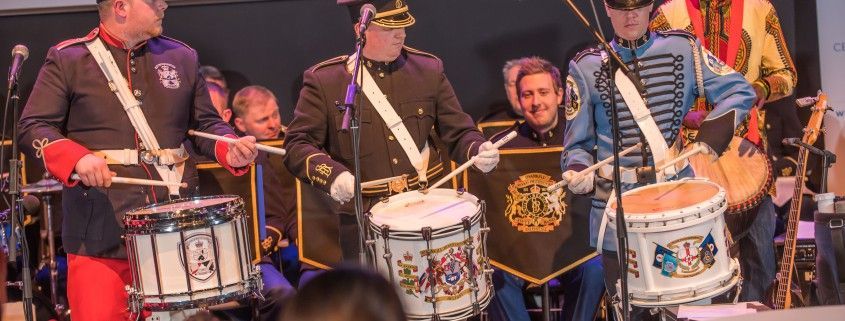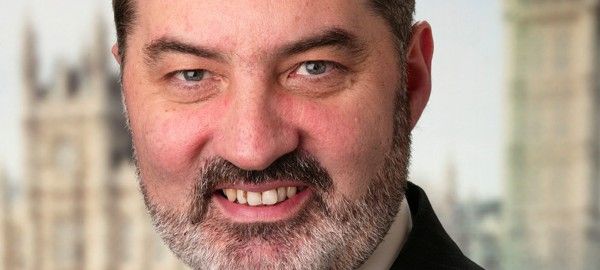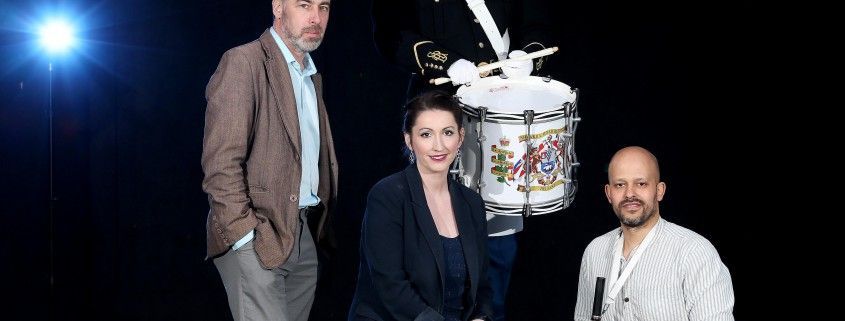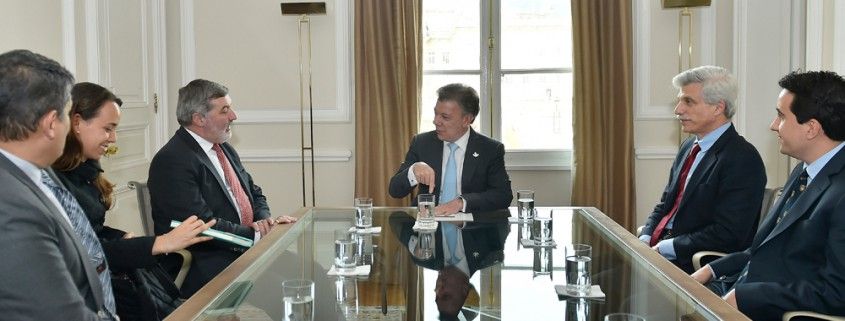Music Unite: Celebrating Culture by Jeffrey Donaldson MP
Music can unite people, cultures, traditions and communities. This was clearly demonstrated by the remarkable ‘Music Unite’ event held at The MAC Belfast last week.
Theatre goers mixed with Loyalist bands in the heart of Belfast’s vibrant Cathedral Quarter – in a space where the diversity of culture brought people and communities together.
It was an evening of music, rhythm, culture, diversity and positivity. The Shankill Road Defenders, Ballykeel Loyal Sons of Ulster and North Down Defenders performed together with an eclectic mix of traditional flute band music fused with Colombian, Kurdish, Ghanaian, Sri Lankan and Irish sounds. Flutes from Ulster, pipes from Colombia, drums from Ghana and Uilleann pipes came together to create powerful symphony.
The Music Unite event was the highlight of what has been an incredible and transformative project.
I grew up in a culture of bands, joining Orangefield Flute Band, Kilkeel when I was still in Primary School and over a number of years of hard practice graduating from percussion to the flute in what was one of the finest part-flute bands in County Down. I well remember bursting with pride as I donned my band uniform for the first time and marched all the way from Ballinran Orange Hall to Kilkeel for the annual Twelfth parade. In later years I was a founding member of the Pride of Ballinran Flute Band, today one of the best melody flute bands in the country. Therefore, I know the bands scene well and recognise the invaluable contribution that marching bands make to the lives of many young people. Those young people experience what it is like to be part of a team – to make a contribution in creating musical and human harmony and learning a sense of discipline that stands them in good stead for the challenges of a modern society.
With my interest in marching bands, I have seen at first hand the tremendous local talent that exists but is often overlooked within the music scene. Sir James Galway developed his immense musical ability in a flute band in Belfast and there may well be other James Galway’s in the ranks of such bands across Northern Ireland. Music Unite offers a platform for bands to display their undoubted talent to a wider audience with whom they may not normally connect and is designed to break down barriers and challenge perceptions and stereotypes that are often associated with the local band scene. This is not about persuading people to alter their identity or to change their culture to suit others. It is about promoting a better understanding of that culture and enabling people to engage with each other in a way that promotes greater harmony across our community.
This does not mean that we overlook the problems sometimes associated with parading and music in Northern Ireland. Far from it. I recognise that this is a controversial issue for some and that a minority on both sides of this debate sometimes engage in behaviour that is unacceptable. However, the idea that the way to resolve this or to alter negative behaviour is to isolate or punish an entire musical fraternity is one that needs to be challenged. Inclusivity must be practised and not just preached and ought not to require people to abandon their beliefs or their identity or to somehow whitewash their culture to create some kind of unrealistic neutrality. Diversity surely implies respect for difference, although that respect has to be gained and not just taken for granted.
Last year the Centre for Democracy & Peace Building in partnership with ‘Beyond Skin’ launched the ‘Music Unite’ programme. Our partners at Beyond Skin lead by the brilliant Darren Ferguson are to be commended for their pioneering work with this project.
This work began with the Shankill Road Defenders with the aim of using music to unify people and empowering and enabling individuals and communities.
Our innovative programme enabled Loyalist bands to meet, exchange ideas & music genres with people from other backgrounds and cultures, develop musical skills, build capacity and challenge stereotypes.
In the past year, the Shankill Road Defenders have performed in numerous events in places that would have been simply unimaginable just a few years ago. This included playing to hundreds of people as part of the Culture Night Belfast and a performance at Belfast City Hall as part of the British-Irish Intergovernmental Secretariat’s St Patrick’s Day reception. The band also played with the North Down Defenders at the Chinese Welfare Association in Belfast earlier this year. Cultures and communities united by music.
It’s been an incredible journey. The bands involved in this project have demonstrated remarkable vision, energy and leadership. They have engaged positively with this project – perfecting their musical skills and collaborating with musicians from around the world. They have been ambassadors for the positive contribution that loyalist bands make to our musical heritage and culture in Northern Ireland.
A report highlighting the success of Music Unite by Professor John Brewer and Dr Francis Teeney from the Senator George J. Mitchell Institute for Global Peace, Security and Justice at Queen’s University Belfast has been published by the Centre for Democracy and Peace Building. I commend the authors for endorsing the programme and note the important recommendations they have made. This will no doubt promote further debate and discussion on the way forward. We must continue this vital work and give further consideration to the recommendations contained within the report. The Report is available at https://democracyandpeace.org/wp-content/uploads/2016/01/Music-Unite-Report.pdf
Music Unite is the start of a new flow, a new rhythm that brings people together. It challenges perceptions and stereotypes. Importantly, it provides hope that Northern Ireland is moving forward together to a new beat – one which creates a positive celebration of our unique and diverse culture and identity.
Independent documentary ‘Born and Reared’ to launch at the Lyric Theatre Belfast
‘Born and Reared’ will launch at the Lyric Theatre Belfast in April – then in London in May 2016 with 3 screenings including the House of Commons, before beginning tour and community outreach programme across the UK and Ireland.
‘Born and Reared’ is a moving documentary that explores contemporary Northern Ireland, through the lives of four men living in the aftermath of violent conflict; a story about re-imagined identity of place and the fragility of masculinity.
Contextualised by the country’s past the film is firmly rooted in the Northern Ireland of today as a population struggles to come to terms with the horrors and the sacrifices of its past and the men turn to face a future defined by their hopes, rather than regret.
Filmed over a year with the men in and around their homes, the filmmakers focused on the stories that took place long after the cameras had left the news story that was Northern Ireland. Thirty years of violence came to an end in a 1998 peace deal and the door on almost relentless media interest also closed. But the lives of those affected indirectly or otherwise by the so-called ‘Troubles’ continued…
In a society where masculinity has long been measured in violence and aggression, what happens to the identities of men when the Troubles end and the roles previously held are no longer accepted or needed? How do you go from being a soldier defending your country, to being a joiner or a taxi driver in ‘peace time’?
In this film you will meet then 16 year old Danny who was born the year of The Good Friday Agreement, he talks about how he “loves his city, but he doesn’t know if he loves his country because he doesn’t know what country he belongs too”. Danny is a positive voice for the future, but he also still carries so much of the weight on his shoulders from the legacy of his country’s past. Billy lost his father in The Troubles. He was shot whilst placing a bet in the Sean Grahams on the Ormeau Road. Billy is now a father and husband and he walks past the betting shop everyday on his way to work. Billy wants people to co-exist side by side today. He also still feels the hurt and pain that’s been left behind and isn’t sure that it’ll ever go away. Bobby is an ex-Loyalist paramilitary who served 16 years in prison. Bobby is now a born again Christian living in Bangor and working as a joiner. He is a father and a husband and he now works in the prisons he once served time in, teaching art and working with inmates. Bryan is a pigeon fancier and his pigeons provided him with an escape route from getting involved. However, he is still affected by the legacy of the past today. He talks honestly and openly about the kingmakers that still exist.
The four characters are all vulnerable and strong. Their stories are powerful, courageous, moving and contemporary.
The launch organised in partnership with the Centre for Democracy and Peace Building will take please at the Lyric Theatre Belfast on 12 April. To register please go to www.getinvited.to/cdpb/bornandreared
Leadership Academy: Social Media and Challenges of Conflict and Prejudice
By India Fahy, Washington Ireland Program Class ’15
We have hosted the third #LeadershipAcademy last month. As you may be able to tell from my perpetual hash-tagging, the focus of the session was social media and its relevance to the challenges of conflict and prejudice. We heard from Nick Pickles, Head of Public Policy at Twitter, Enda Young, founder of Transformative Connections, and Oxford researcher Lydia Wilson.
Nick provided a fascinating insight into the concept of positive messaging and really drove home the responsibility borne by social media platforms, such as Twitter. I was inspired by some of the facts and figures presented, which demonstrate that users are standing up more and more often, challenging what they think is unacceptable content. Nick stressed that people are much more likely to have a healthy debate, conducive to productive outcomes, if they see that negative narrative challenged. That being said, Nick stressed that although social media now plays a role in conflict, with that comes immense challenges. He stressed the fact that whole teams of people are dedicated to drafting ‘responsible posting’ guidelines, and that Twitter are very aware that they have a responsibility to ensure that they respond appropriately to any irresponsible usage of their platform. The question that Twitter are facing, Nick said, is ‘how do we ensure that our platform is used to challenge the narrative, and isn’t a platform for people to promote terrorism.’ In typical Twitter fashion the presentation ended with a 21st Century ‘If you have any questions… you could always Tweet me’.
Enda Young, co-founder of Transformative Connections, gave a wonderful presentation about the use technology for peace building, or #PeaceTech. How can we effectively harness the power of social media, and technology, to harmonise conflict? How do we ‘de-jargonise’ social media so that we can effectively harness its power to harmonise conflict? How we measure the real life impact of social media will be crucial to our understanding. How do we translate tacit support i.e. a ‘like’ on Facebook into action? Social media presents an unprecedented opportunity for crowd-sourced information. Where does this data meet government focused statistical analysis?
One thing that particularly sparked my interest was the concept of fact-checking. Enda is involved in the launch of FactCheckNI, a platform designed to allow users to check the accuracy of the information they are viewing on online platforms. After the presentation we discussed the dangers of misinformation, citing recent examples such as an incident in Belfast when a Facebook user posted a photo of a flag supposedly being burnt by City Hall. This provoked a riot, despite imaging software being able to prove that the image had previously been posted years before.
Enda discussed the possibilities for the use of #PeaceTech in furthering the peace process specifically in NI. He presented a project which he is involved in, using virtual reality to engage with a community group and create a community interface, to show them what their community would look like after the interface walls came down. Through this project the offline world has met the online world; they have gathered information offline about what members of the community would like their community to look like, and have created a real life representation, complete with a 3D walk-through. Studies have shown that the use of virtual reality in such circumstances increases the level of empathy and understanding, by helping people to visualise the change and see tangible opportunities for their community.
All of the research carried out by Transformative Connection has been compiled into a concise and accessible report, which Enda presented to us, complete with a super high tech code to scan to access the report (cost-effective, and quite impressive really) – apparently ‘good old fashioned’ QR codes are now old news, who’d have thought?
Lydia Wilson, a researcher at Oxford, presented ‘The Allure of the Islamic State’. Lydia praised Twitter for its record of identifying repeat content, evidenced by the immense difficult she faced trying to track down content. She warned that it would be remiss to describe their attempts as a game of ‘whack a mole’, because contrary to public belief, Twitter is actually slowing them down. Lydia presented a number of stark examples of ISIS’ sophisticated use of technology and social media, including a version of Call of Duty. When it came to Q&A it was fascinating to hear that one of the attendees, a social worker working with youth at risk of radicalisation, had had her eyes opened by the presentation to a whole new possibility of ensuring that the children are not exposed to propaganda.
This #LeadershipAcademy provided a compelling insight into the phenomenon of social media and technological advances, coupled with their immense potential for challenging conflict and prejudice. What is also clear however, is that with this comes an increased risk of hijacking, so we must work to keep it neutral, to ensure that it fulfils its potential as a platform for free and open conversation, conducive to solving disagreements and engaging new voices.
The next Leadership Academy on 26th April 2016 will focus on Understanding and Countering Violent-Extremism. Sign up here: https://getinvited.to/cdpb/leadership/
CDPB Chairman, Lord Alderdice talks to Israel TV about Peace Building
On a brief visit to Israel in March, Lord Alderdice gave an interview that was broadcast on Israel TV1′ s main Saturday evening Foreign Affairs programme. There was a lot of positive comment from various parts of the Middle East and we thought that CDPB web-site followers might be interested to see it too.
The interview is short, but in a few minutes Lord Alderdice maps out some of the key elements to the approach that he took in addressing the Talks in Northern Ireland and the subsequent long-term and continuing process of implementation of the Good Friday Agreement. He also discusses the similarities and differences between the problems facing Israelis and Palestinians in their long-standing conflict, and the applications and limits of experiences in one conflict as applied to other places.
Music Unite: Bands March To The Beat Of Their Own Drum
A new report into the Music Unite project has shown how music can unify people, address alienation and challenge stereotypes.
The report by Professor John Brewer and Dr Francis Teeney from the Senator George J. Mitchell Institute for Global Peace, Security and Justice, (Queen’s University Belfast) has been published by the Centre for Democracy and Peace Building (CDPB).
The report specifically examines the Music Unite pilot project developed by CDPB in partnership with Beyond Skin.
The project gave the Shankill Road Defenders Flute Band the opportunity to meet and exchange ideas and genres with musicians from other backgrounds and cultures, develop new skills and challenge stereotypes associated with the Loyalist bands.
Junior Minister Emma Little Pengelly said:
“Tonight’s showcase clearly demonstrates how bringing people together from diverse cultures and backgrounds can break down barriers, change perceptions and help build a more united community. The Music Unite project is a great example of work undertaken to deliver the aims of the Northern Ireland Executive’s Together: Building a United Community strategy. We are determined to build a more reconciled and united Northern Ireland. Building on a shared interest Music Unite has given the people who took part the opportunity gain new skills, experience and, most importantly, an understanding of each other. Tonight’s showcase shows just what can be achieved when we work together.”
Professor John Brewer said:
“Through the study we wanted to see if we could change perceptions of the Loyalist flute band culture by allowing the members of the Shankill Road Defenders the opportunity to meet other musicians, exchange musical ideas and genres and widen their musical horizons and repertoire.
“The study demonstrates that music is indeed a powerful way of drawing together people from diverse backgrounds. It is widely accepted that there is a growing sense of alienation amongst young working class Loyalist men and we are delighted to say that the project was warmly welcomed by all involved and especially SRD participants who do feel that their music and cultural expressions are greatly misunderstood.”
An event to showcase the Music Unite project was held at the MAC Belfast on 30 March and featured an eclectic mix of traditional flute band music fused with Colombian, Kurdish, Ghanaian, Sri Lankan and Irish sounds. There were performances by Shankill Road Defenders, North Down Defenders and Ballykeel Loyal Sons of Ulster.
At the event, Beyond Skin also showcased their two international flagship projects connected to Music Unite – WOMAD NI and Parallel Versing with special guests from Sri Lanka and Colombia in attendance.
Chief Executive of the Centre for Peace Building and Democracy, Eva Grosman said:
“We were keen to demonstrate the power of the arts in contributing towards peace-building in Northern Ireland. Following the success of the pilot project with The Shankill Road Defenders, we are delighted to provide opportunities like this to many other bands with our partners Beyond Skin who have enabled us to collaborate with international musicians.
“The project gives Loyalist band members an opportunity to interact with musicians from different cultures and celebrate their own identity whilst addressing some of the very negative stereotypes that exist around these bands.”
Senior members of CDPB offer assistance in Colombian Peace Process
As we come to a critical period in Colombia’s history, senior members of CPDB have returned to offer assistance on a number of fronts.
The negotiations between the Government of Colombia and senior officials of FARC are coming to a conclusion and though it had been clear for some weeks that the March 23rd deadline would not see the signing of an agreement, it was equally clear that the commitment of both sides is very likely to see a positive outcome within weeks.
Director, Jeffrey Donaldson MP and Chairman, Lord Alderdice both made separate visits during March to follow on their previous involvements in the Colombian Peace Process.
In his three-day visit Jeffrey Donaldson continued his work with other Northern Ireland politicians engaging with FARC political figures and elected and governmental officials, including the Presidents of the Senate and the House in the Colombian Congress.
Lord Alderdice met senior government officials including the country’s President, Juan Manuel Santos and also spent much of his week-long visit encouraging and supporting university and professional groups and peace NGO’s, including the Colombian Peace Council and the Centre for Memory Peace and Reconciliation in Bogota. He focussed in on the needs of the seven million victims of the decades of violent conflict and explored the challenges the Government faces in re-integrating thousands of former guerillas and paramilitaries. He also addressed meetings of senior private sector CEO’s in Colombia about the opportunities and responsibilities of the business and commerce communities to contribute to the implementation of the Peace Agreement when it comes.
Speaking to the press in the Presidential Palace in Bogota after his meeting with President Juan Manuel Santos, Lord Alderdice said:
“I had an excellent meeting with the President and assured him of the support and good wishes for the Colombian Peace Process of the more than 100 member parties of Liberal International, of which I am Presidente d’Honneur, and also of people across the United Kingdom and Ireland. We discussed in some detail the challenges of completing the negotiations in the very near future, seeking public affirmation in a plebiscite and the difficult and inevitably long-term work of implementation during the rest of his Presidency and beyond. The President is working extremely hard to deliver a peace that will make for a better future for the children of Colombia, and for their sake this unprecedented opportunity for a settlement must not be lost.”
CDPB intends to continue to respond positively to the requests for assistance from Colombia.






